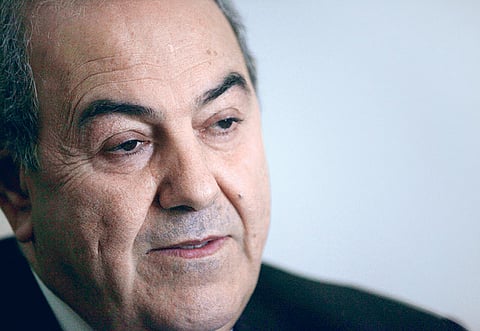Allawi faces challenges
As a secular Shiite, the Iraqiya leader is being likened to Saddam

Leader of the Iraqiya coalition and former prime minister of Iraq Eyad Allawi is gradually finding himself in a situation where he could be left out in the cold. Though he fought the March elections with a national secularist platform against main rival Prime Minister Nouri Al Maliki, leader of the State of Law coalition, Allawi could well become a victim of the widespread suspicion among the Shiite majority towards those who are suspected of being Baathists loyal to former dictator Saddam Hussain.
Allawi, a Shiite himself, has made it clear through his shuttle-diplomacy trips before and after the elections that he prefers to keep neighbouring and highly influential Iran at bay. This policy appealed to minority Sunnis, contributing significantly to him winning 91 seats in parliament. But it also caused him to be viewed by some Shiites as a renegade — a dangerous thing in a land plagued for centuries by sectarian division and violence, and increasingly by foreign interference.
Bad old days
Allawi's critics argue that if he ever managed to clinch the premiership, Iraq may end up much as it was under Saddam. The leader of the Iraqiya coalition is seen to be leaning towards a similar style to that of Saddam in the late 1970s. He is being typecast as America's man in Iraq, a secular nationalist and an advocate of pan-Arabism, resisting the feared power of Iran. He has even been rebellious enough to hold talks with dissident Baathists abroad on reconciliation. In this he has the support of the current US administration and so he has defied the de-Baathification process, resulting in a fierce battle for legitimacy between suspected Baathist candidates and the Supreme National Commission For Debaathification. Ironically, fundamentalist Sunnis in the region back Allawi, with his supposedly secular agenda. They prefer him to what they describe as "Tehran's man", Al Maliki, who holds stronger Shiite religious views. They believe that if Allawi came to power, further marginalisation of Iraqi Sunnis would be less likely.
This state of affairs is similar to that in the Gulf during the Iran-Iraq War (1980-1988). Sectarianism is becoming deep-rooted, to the extent that debates about secularist parties holding serious liberal agendas are becoming farcical.
Oddly enough, it was Saddam who crushed secularism in his country when he encouraged religious sentiments among Shiites through his systematic exclusion of secular Shiite politicians, forcing hundreds of thousands to flee to Iran. He relied heavily on a Sunni base and put a stop to fundamentalist activities until after the liberation of Kuwait.
Despite his desire to weaken Iran's influence on Iraq, US President Barack Obama is most interested in sticking to his schedule for the withdrawal of all combat troops by August this year, only three months ahead of crucial congressional elections at home. His reluctance to interfere too deeply in the talks to form a new government in Baghdad demonstrates his growing determination to leave the reshaping of the political scenery to Iraqis themselves, assisted by their neighbours.
Sidelined
Since the next government will be formed along sectarian and ethnic lines, Allawi's Iraqiya might find itself in a position where it will be considered a Sunni faction by the Shiites. This would force Allawi out of the equation for government posts, because he is a Shiite to Sunnis. Allawi must fight to prove that the support he gets from Sunnis inside Iraq and in other Arab states with a similar history won't result in a deformed, secularist regime wearing a Saddamist, sectarian Halloween costume.
Allawi's so-called "national secular perspective" will be severely tested in coming days and weeks. He could start by retracting his repeated incendiary warnings that there could be a return to sectarian violence if he is barred from the premiership. Allawi also needs to send a clear message to his neighbours that it is not only Iranian interference that is not welcomed, but also that of the "American occupiers", as he has always referred to the Multi-National Force in Iraq.
Rauf Baker is a Dubai-based journalist who specialises in Eastern European Affairs.



